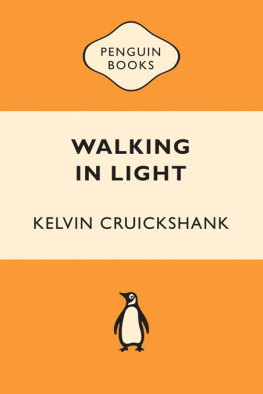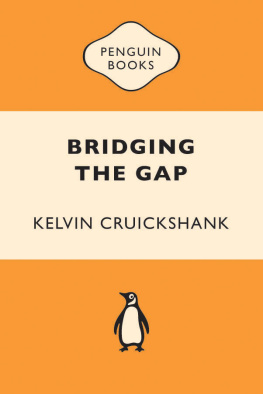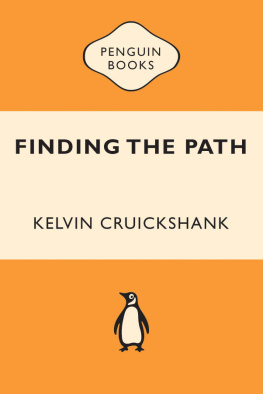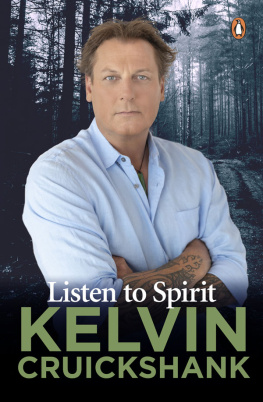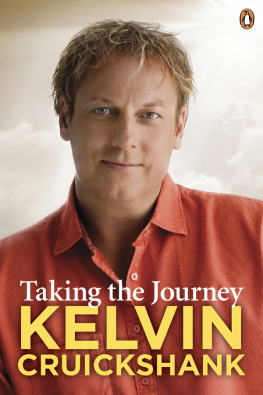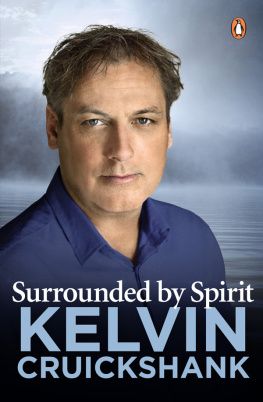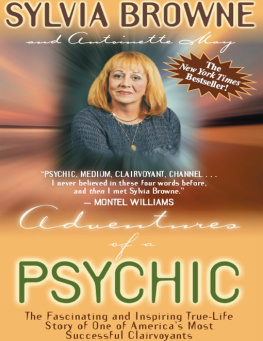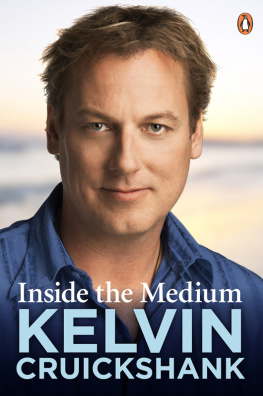Walking in Light
Kelvin Cruickshank
PENGUIN BOOKS
Published by the Penguin Group
Penguin Group (NZ), 67 Apollo Drive, Rosedale, North Shore 0632, New Zealand (a division of Pearson New Zealand Ltd)
Penguin Group (USA) Inc., 375 Hudson Street, New York, New York 10014, USA
Penguin Group (Canada), 90 Eglinton Avenue East, Suite 700, Toronto, Ontario, M4P 2Y3, Canada (a division of Pearson Penguin Canada Inc.)
Penguin Books Ltd, 80 Strand, London, WC2R 0RL, England
Penguin Ireland, 25 St Stephens Green, Dublin 2, Ireland (a division of Penguin Books Ltd)
Penguin Group (Australia), 250 Camberwell Road, Camberwell, Victoria 3124, Australia (a division of Pearson Australia Group Pty Ltd)
Penguin Books India Pvt Ltd, 11, Community Centre, Panchsheel Park, New Delhi 110 017, India
Penguin Books (South Africa) (Pty) Ltd, 24 Sturdee Avenue, Rosebank, Johannesburg 2196, South Africa
Penguin Books Ltd, Registered Offices: 80 Strand, London, WC2R 0RL, England
First published by Penguin Group (NZ), 2009
Copyright Kelvin Cruickshank 2009
The right of Kelvin Cruickshank to be identified as the author of this work in terms of section 96 of the Copyright Act 1994 is hereby asserted.
Digital conversion by Pindar NZ
All rights reserved. Without limiting the rights under copyright reserved above, no part of this publication may be reproduced, stored in or introduced into a retrieval system, or transmitted, in any form or by any means (electronic, mechanical, photocopying, recording or otherwise), without the prior written permission of both the copyright owner and the above publisher of this book.
A catalogue record for this book is available from the National Library of New Zealand.
www.penguin.co.nz
ISBN 9781742288703
Contents
Chapter 1
The spirits of the land
Ive seen spirit all my life. Even as a toddler in the early 1970s, living in a small house in a small New Zealand country town, Ngaruawahia, I always had imaginary friends people I could see that no one else could and when I met people I always used to sense other people with them. Back then, it wasnt scary or strange. I just thought it was quite normal. I didnt know that it wasnt like this for everyone.
Ngaruawahia is one of those tiny little towns most people whizz through on their way to the cities of Auckland or Hamilton. You might stop for a pie, or twist your neck as you cross the bridge over the Waikato River to get a glimpse of the Maori Kings Turangawaewae Marae. Its in heartland Waikato: surrounded by farms, both dairy and sheep, and some of the most beautiful, gently rolling countryside you can imagine. For us in the early 1970s, it felt like the centre of the world. It always seemed incredibly peaceful, although, as youll see, it has a very bloody history that still resonates in the present for those, like me, who are sensitive to the spirit of people and land.
Dad Les, or Crooky as everyone still knows him was the hydatids control officer for the Raglan County Council, as it was known then. He still lives in Ngaruawahia and although hes retired he works part time at the dog pound. He has a special gift for animals even really savage dogs just turn really soft and quiet around him. We call him the dog whisperer.
Mum Heather stayed at home with my older brother Murray and me for the first few years. She had formerly worked as a volunteer driver for the bus carrying handicapped children. I can remember going on the bus with her before I started school. That was an interesting eye-opener for me I used to make those kids laugh! And from an early age I learned not to judge others. Mum went on to train as a teacher, and is now a reverend in the Anglican church a very spiritual lady.
The person I loved most in the world was my Pop, my mums father, Monty Haack. His wife Hazel, my Nan, I was also extremely close to. They lived in Ngaruawahia, about a kilometre down the road from our house. Once, when I was two or three, I ran away all the way down the road, across several streets, just to get to Pop and Nans house. Poor Mum was frantic, not knowing where Id got to. But I was determined, and I always wanted to be with my Pop. He and I got on like a house on fire. He was a hard man whod ruled his own family with a strong arm, but he was wonderful to me. I was his shadow, totally his shadow, and felt he understood me.
Before I was born he had a fish and chip shop on the main street of Ngaruawahia. He made my mother leave school when she was 13 so that she could work in the shop. He was one of those people who thought that girls didnt need an education.
Mum eventually proved him wrong however, returning to study to be a teacher at Waikato University when I was about seven. Now shes more educated than many people.
By the time I was born, Pop was running an army surplus supply store. He was also a jack of all trades who could build or fix anything in his spare time hed be under a car or in the vegetable garden. He could make his own sinkers and tie his own flies for trout fishing. When whitebait season came around wed be off to Tuakau with his tent and dogs. Parked on the side of the road, wed catch the whitebait and Mum and Dad would come out to get it and sell it on the roadside for a few dollars.
Or wed go out in his boat, netting fish. He had a massive smoker, double the size of a typical garden shed, where wed smoke kahawai and mullet. We used to have the nets strung up and down the section and wed mend the nets. To me, that was fun.
I was very easily bored and needed to be busy all the time. Im still like that Im here to live, not to eat my lunch. As a youngster I was always looking for adventures and challenges, and Pop understood that. Wed get a load of coal and shovel it off the trailer into the coal shed, and then wed go back to the mine and get another load he and I could do that all day. Hed tell me to dig up the garden with a shovel, or mow the lawns. I could chop kindling all day, making piles and piles of it. I used to love growing the veges.
Pop used to take me out to the garden at midnight come on boy, get up when the worms would come to the surface. They were massive, a foot long, and wed get out there with a torch and take a shovel load. You had to be real quick. The next day wed go trout fishing. We used to do heaps of fun things like that.
When I was about four, Dad was promoted by the Raglan County Council to the post of hydatids control officer for the Rotongaro district, and our family left Ngaruawahia to live there. Rotongaros not far from Ngaruawahia about 20 kilometres out of Huntly towards the west coast. It was a tiny community, very picturesque and rural. Nearby was Waikowhai, a big coalmining community, and a few other rural villages Glen Murray, Glen Alton, Glen Massey.
We lived in a small council house, one of three in a row on a hillside, and there was a wee petrol station down the road that only had petrol, no lollies!
Behind the house, we looked down over the rolling paddocks and from my bedroom window I could clearly see a stand of old, native bush that for some reason hadnt been cleared when the land was taken up for farming. Dad told me, Youre not to go into that bush. Its too dangerous. I think there was a well in there, or something that he was worried about. But from my point of view, all I wanted to do was go and play in the scrub.
So one day I must have been about four I ventured across the paddock and walked the fence line around the bush. It felt as though 100 eyes were looking at me I could sense other people in this clump of scrub, watching me. I told myself I was only afraid because Dad had talked me into thinking the bush was unsafe. But after that, things were never the same again.

